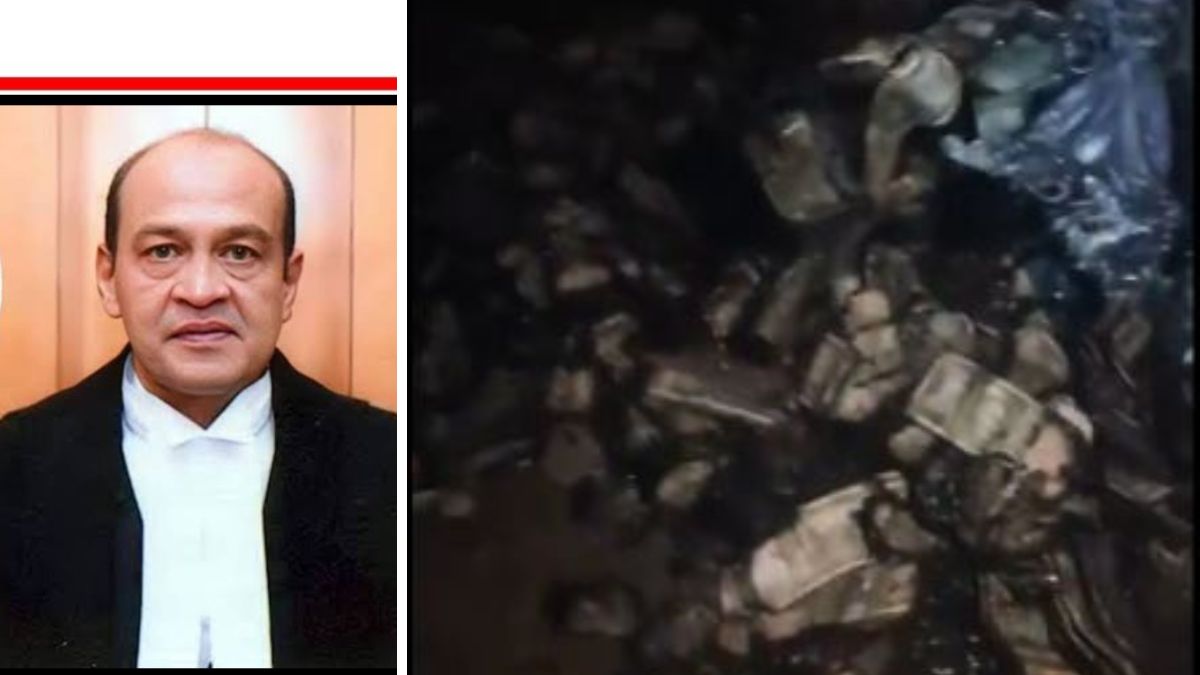Delhi cash discovery row: Why did judicial panel recommend Justice Yashwant Varma’s removal?
 Justice Yashwant Verma (Right) Burnt pile of cash found at his official residence | X
Justice Yashwant Verma (Right) Burnt pile of cash found at his official residence | X
Blaming Justice Yashwant Varma, now posted at Allahabad High Court, for not filing a police complaint nor informing the judiciary about the heaps of burnt currency notes found during his absence from his official residence in the national capital, the judicial panel termed his silence and behaviour unnatural, and found the charges serious enough to recommend his removal to the Chief Justice of India.
The damning details of the three-member inquiry committee that was set up by former Chief Justice of India Sanjiv Khanna stated there was sufficient substance in the claims. Based on this committee’s report, CJI had sent the report to the president of India and the prime minister’s office for further action.
The committee noted in detail eyewitness accounts and visual documentation which confirmed the presence of a large stash of cash at his home. What troubled the committee more than the money was Justice Varma’s complete inaction, raising questions about propriety, accountability, and the credibility of someone expected to uphold the rule of law.
The panel heard testimonies from 55 witnesses, including Justice Yashwant Varma’s daughter, and found consistent accounts from the fire brigade and police personnel. Supporting videos and photographs showed a large pile of Rs 500 notes scattered across the floor of a storeroom in his residence, evidence that the panel said could not be ignored.
According to the report, “Several eyewitnesses saw heaps of currency notes, some even half-burnt inside Justice Yashwant Varma’s Delhi residence. Yet, he neither filed a police complaint nor informed the judiciary. A Supreme Court-appointed inquiry panel, which looked into these allegations, called his silence and behaviour unnatural, and found the charges serious enough to recommend his removal.”
At least 10 witnesses examined by the panel acknowledged having seen burnt or half-burnt currency notes. One witness said, “As I entered, I noticed that on the right hand side and in front, there was large pile of cash only of Rs 500 denomination lying on the floor. I am not sure whether any such notes of Rs 500 denomination were there on the ledge or not. I was shocked and surprised such large amount of cash which was strewn on the floor, which I saw for the first time in my life.”
The committee also looked into the questionable roles of Justice Varma’s private secretary, Rajinder Singh Karki, and his daughter, Diya Varma, in what appeared to be an attempt to destroy evidence or clean up the scene after the fire.
Karki, according to witness accounts, allegedly told fire personnel not to mention the currency notes in their report and oversaw the cleaning of the room the following day. Though he denied both claims, multiple witness statements and electronic evidence contradicted his version, pointing to a deliberate effort to conceal what had happened.
“Keeping in view the direct and electronic evidence record, this Committee is firmly of the view that there is sufficient substance in the allegations raised in the letter of Hon’ble the Chief Justice of India dated 22.03.2025 and the misconduct found proved is serious enough to call for initiation of proceedings for removal of Justice Yashwant Varma, Judge of the Allahabad High Court,” concludes the report.
The panel also observes that the judge, who was in Bhopal at the time of the fire incident, chose not to visit the storehouse immediately after returning home.
The report says that at least two CRPF personnel on guard duty at the residence told the panel that the “door of the store room was locked at the time of the fire and that they had assisted in breaking open the lock”.
One video, shot by a firefighter, which was made public by the Supreme Court of India, has somebody referring to the burning currency as “Mahatma Gandhi me aag lag rahi hai."
Quoting the Restatement of Values of Judicial Life, a code adopted by the Supreme Court in its Full Court meeting on May 7, 1997, the panel noted that the public holds members of the higher judiciary to exceptionally high standards. It stressed that integrity is not just a desirable trait but the most essential and non-negotiable qualification for anyone holding judicial office.
“The very existence of judicial office is founded upon the trust of the citizens at large. The quality and quantity of this trust is directly relatable to the behaviour, conduct and performance demonstrated by the judge, not only inside but also outside the courtroom. Any deficiency in this regard erodes public trust which ought to be viewed stringently,” the committee report stated.
In his detailed 101-page response to the inquiry panel, Justice Yashwant Varma strongly objected to the framing of issues laid out by the then chief justice of India in a letter dated March 22. He argued that the process unfairly presumed his guilt, placing on him the uphill task of disproving a fact that is already assumed to be prima facie true.
Justice Varma maintained that there was no concrete or incriminating evidence on record and that it was the panel’s duty to first establish the facts of each allegation. “Only when the committee finds prima facie substance in the charges,” he argued, should I be required to respond not the other way around.” The panel, in its report, summed up his position as an objection to the reverse burden of proof being placed on him, particularly in relation to the alleged recovery of currency from his storeroom.
Now transferred back to his parent High Court in Allahabad, where he has not been assigned any judicial work, Justice Varma continues to maintain his innocence. He has neither resigned nor opted for voluntary retirement and has repeatedly called the proceedings against him fundamentally unjust.
India